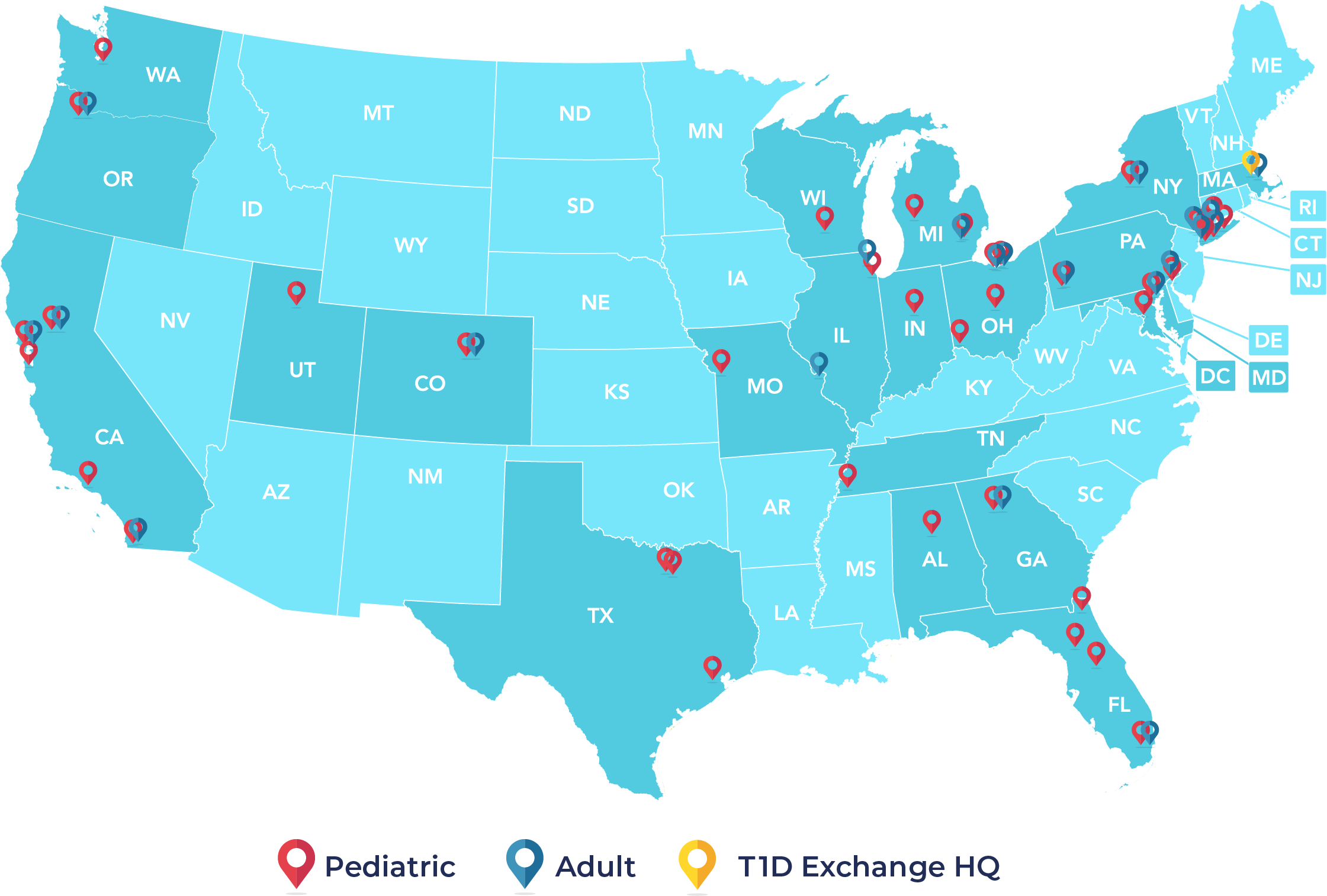Quality Improvement Centers

Current Centers
The T1D Exchange Quality Improvement Collaborative (T1DX-QI) brings together 62 centers situated across the US and treating more than 100,000 individuals with type 1 diabetes and 35,000 with type 2 diabetes. The T1DX-QI has achieved unprecedented success because it relies on an embedded and systemic approach: individual providers are empowered to identify areas of unmet need within their centers. They make small changes in care that scale up through the T1DX-QI to create best practices, which are then shared among and implemented by members at other centers.

All Centers
Albert Einstein College of Medicine
Ann & Robert H. Lurie Children’s Hospital of Chicago, Pediatric Endocrinology
Barbara Davis Center for Diabetes, Adult Clinic
Barbara Davis Center for Diabetes, Pediatric Clinic
Boston Medical Center
Children’s Health, UT Southwestern Medical Center
Children’s Healthcare of Atlanta, Pediatric Endocrinology
Children’s National
Children’s Hospital Los Angeles, Endocrinology, Diabetes and Metabolism
Children’s Mercy Kansas City, Childhood Diabetes Center
Cincinnati Children’s Endocrinology
Cleveland Clinic, Adult Endocrinology
Cleveland Clinic, Pediatric Endocrinology
Cohen Children’s Northwell Health, Pediatric Endocrinology
Cook Children’s, Endocrinology
Corewell Health, Helen DeVos Children’s Hospital, Pediatric Diabetes
Grady Memorial Hospital
Indiana University School of Medicine, Pediatric Endocrinology
The Johns Hopkins Hospital, Adult Endocrinology
The Johns Hopkins Hospital, Pediatric Endocrinology
Le Bonheur Children’s Hospital, Diabetes and Endocrinology
Mount Sinai, Children
Mount Sinai, Adults
Naomi Berrie Diabetes Center, Adults
Naomi Berrie Diabetes Center, Pediatrics
Nationwide Children’s, Endocrinology
Nemours Children’s Health, Delaware
Nemours Children’s Health, Jacksonville
Nemours Children’s Health, Orlando
Northwestern Medicine
NYU Langone Health, Center for Diabetes & Metabolic Health
Hassenfeld Children’s Hospital at NYU Langone
NYU Langone Hospital—Long Island
Oregon Health and Sciences University Adult Endocrinology
Oregon Health and Sciences University Pediatric Endocrinology
Penn Medicine, Penn Rodebaugh Diabetes Center
Rady Children’s Hospital San Diego, Endocrinology / Diabetes
Seattle Children’s, Endocrinology and Diabetes
Stanford Children’s Health, Lucille Packard Children’s Hospital
Stanford Health Care, Endocrinology Clinic
Texas Children’s Hospital, Diabetes and Endocrinology
UF Health Pediatric Endocrinology
University Hospitals
UH Rainbow Babies & Children’s Hospital
University of Alabama at Birmingham
University of California Davis Health, Adult
University of California Davis, Pediatrics
University of California, San Diego Health, Adult
University of California, San Francisco, Pediatric Clinic
University of Miami Health System, Endocrinology, Diabetes and Metabolism
University of Miami Health System, Endocrinology, Diabetes and Metabolism, Pediatric Endocrinology
University of Michigan, C.S. Mott Children’s Hospital, Pediatric Diabetes
University of Michigan Health
University of Pittsburgh, Adult Clinic
University of Pittsburgh, Pediatric Clinic
University of Texas Southwestern, Pediatric
University of Utah, Intermountain Healthcare, Pediatrics
Upstate University Hospital, Joslin Diabetes Center, Adult Endocrinology, Diabetes and Metabolism Program
Upstate University Hospital, Joslin Diabetes Center, Pediatric Endocrinology and Diabetes
University of Wisconsin
Washington University, St. Louis, Missouri
Weill Cornell Medicine, Pediatric Endocrinology







